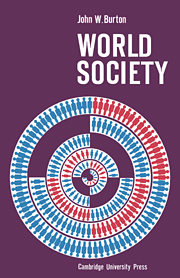Summary
Let us now take a brief look at the history of the study of world society, and the different approaches that have been adopted.
Stages in thinking
The study of world society has passed through many stages even during this century, and especially during the last two decades. Trends in thought occur in response to changes in the environment in which scholars are thinking. This environment has two interacting features. There are the changes that occur in the structure of world society due to population growth, discovery, invention, political developments, improvements in communications, education and social organization. There is also the environment of scholarship. Knowledge and techniques in one area, such as economics, psychology and engineering, provide insights and methods that are relevant to other areas, such as education and international relations. Innovation and thinking in any one field promote innovation and thinking in many others, with the result that in all disciplines the rate of discovery is an ever increasing one. One of the consequences of this interaction has been a far greater interest in recent years in world society and behaviour of peoples within it as a subject for study. The narrower interest in institutions and relations between state authorities is waning because of greater interest in human behaviour and social organization at all levels. Furthermore, world society is itself in the process of making a choice, or altering its behaviour. It is less and less pursuing political and constitutional means of organizing its affairs and solving its problems, and more and more employing specific, universal, professional institutions to control and coordinate activities.
- Type
- Chapter
- Information
- World Society , pp. 10 - 18Publisher: Cambridge University PressPrint publication year: 1972



